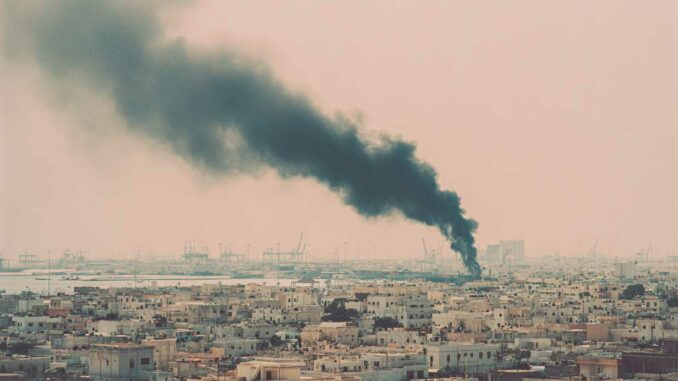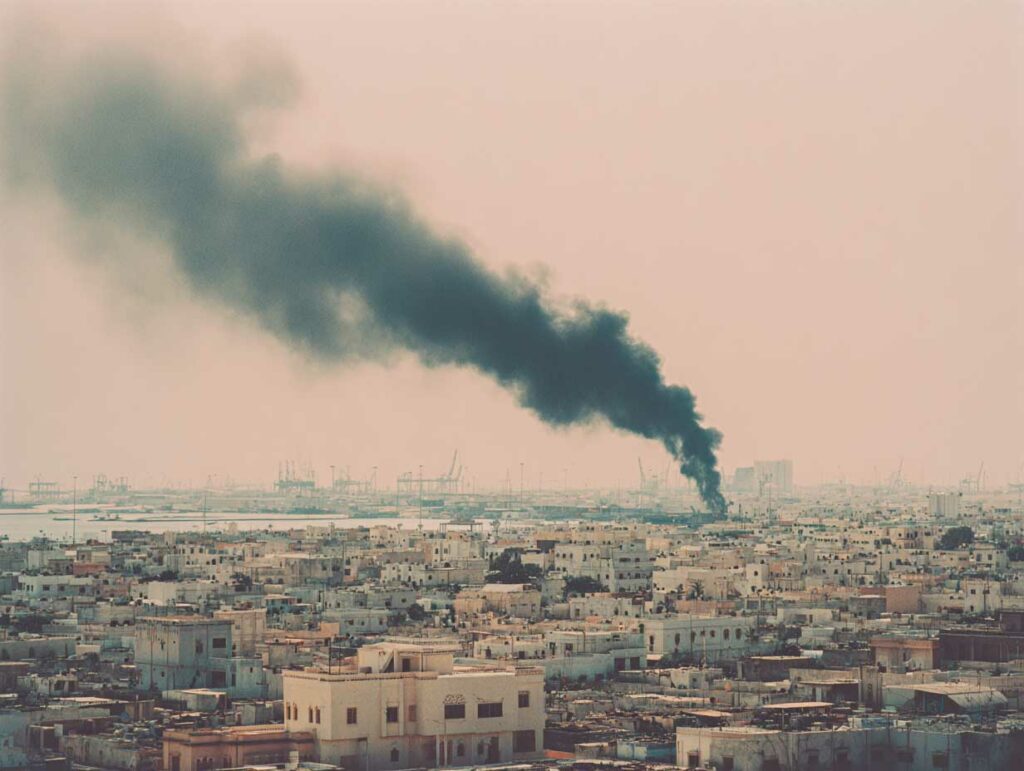
Comprehensive analysis: legal legitimacy, diplomatic reactions, implications for peace, and risks of regional escalation following the Israeli raid on Qatar.
On September 9, 2025, Israel carried out an airstrike targeting Hamas leaders in Doha, the capital of Qatar, in the Leqtaifiya neighborhood. According to reports, explosions targeted a residential complex used as Hamas’ political headquarters, while several of its senior officials were gathered for a meeting on a US ceasefire proposal currently under negotiation.
The death toll stands at six: the son of Khalil al-Hayya, his office manager, three bodyguards, and a Qatari security agent. The major leaders of Hamas (including Khalil al-Hayya, Khaled Mashal, Muhammad Ismail Darwish, and Zaher Jabarin) were reportedly present but, according to them, all survived.
International law and the legitimacy of the strikes
The principle of sovereignty and the prohibition of the use of force
Under international law, every state has the right, recognized in particular by the United Nations Charter (Article 2(4)), to have its territorial integrity and political sovereignty respected. Any military attack on the territory of another state without its consent constitutes, in principle, a violation of international law.
The exception of the right to self-defense
Article 51 of the UN Charter authorizes individual or collective self-defense in the event of an armed attack. However, several conditions must be met:
- Armed attack: it must be a violent act giving rise to the right to respond.
- Necessity: there must be no less traumatic or less intrusive measures to achieve the same objective.
- Proportionality: the response must be proportionate to the danger.
Application to non-States and territories of a third State
Hamas is considered a non-State actor. International law recognizes that non-States may commit attacks that open the possibility of retaliation by a State, even if these attacks take place from the territory of another State. However, this doctrine is controversial and subject to strict criteria:
- Either the host state has consented or cooperated, or it is unable or unwilling to prevent attacks launched from its territory. This is referred to in the literature as the “unwilling or unable” standard.
- It must be established that the threat is imminent or that recent attacks justify a response.
Application to the Doha case
In this case:
- Israel argues that Hamas leaders believed to be responsible for recent assassinations, attacks, or threats to its population were meeting in Doha to discuss a ceasefire proposal.
- Qatar claims it was not informed prior to the strikes and condemns the attack as a flagrant violation of sovereignty.
If international law is strictly applied, Israel could justify this action on the grounds of self-defense, but only if:
- the targeted leaders posed a manifestly imminent or direct threat;
- there was no reasonable alternative (diplomatic, legal) to neutralize this threat;
- the operation was proportionate to the military objectives pursued;
- the political cost and collateral damage (including civilian casualties, damage to infrastructure, and damage to the integrity of the host state) did not exceed what was necessary.
As it stands, several observers believe that the strike violates the principles of sovereignty, because Doha did not give its consent and because the imminent threat or the impossibility of acting otherwise has not been clearly established publicly. Nevertheless, this operation illustrates Israel’s determination to pursue an uncompromising counterterrorism strategy, undertaking extraterritorial actions that very few states in the world have dared to undertake with such visibility.
Implications for peace talks
Possible breach of trust in mediation
Qatar has long played a mediating role between Israel and Hamas, particularly in ceasefire negotiations and hostage exchanges.
A strike of this kind on its soil, targeting Hamas while it is participating in negotiations, compromises this mediating position. Hamas could decide that any discussion is without guarantee, and Israel could lose some of the diplomatic access that Qatar offered it.
Risk of suspension or abandonment of negotiations
Hamas leaders may have survived, but members were killed and officers described as relatively close to the negotiations perished. Even if senior officials survive, logistics, trust, and communication channels could be seriously disrupted.
Israel may hope to influence the negotiations by weakening Hamas’s decision-making structure, but this type of attack may push the other side to harden its position or reject any future proposals, believing that force prevails over dialogue.
A destabilizing factor for ceasefire proposals
The strike came just as a US ceasefire proposal was on the table. This risks rendering it obsolete or changing its terms. Hamas could demand additional guarantees or other terms in order to agree to future negotiations.
Furthermore, other states involved (the US, Egypt, Saudi Arabia, etc.) could judge Israel’s commitment to be unreliable or dangerous for their own diplomatic interests in the region.

Qatar’s official reaction
- The Qatari government has condemned the attack as a “flagrant violation” of international law and the sovereignty and territorial integrity of the State of Qatar.
- Qatar denies having been warned of the operation. An official statement indicates that the information received from the US authorities came during the explosions, not as a useful warning.
- Doha deplores the civilian casualties, including the death of a Qatari security officer.
- Diplomatically, Qatar is calling for an international investigation and implicitly threatening measures, particularly in international forums, to preserve its sovereignty. For the moment, no military response has been announced, but diplomatic tensions are high.
Information on the targeted leaders
The following are the main Hamas leaders mentioned as being present or targeted:
| Name | Role in Hamas / governing position | Status after the strike |
|---|---|---|
| Khalil al-Hayya | Deputy head of the Political Bureau, key figure for Gaza negotiations | Present in Doha, reportedly not killed |
| Khaled Mashal | Former head of the Political Bureau, senior international representative | Said to be present, no confirmed fatality |
| Muhammad I. Darwish | President of the Shura Council, member of the Doha-based leadership | Reported present, survived according to Hamas |
| Zaher Jabarin | Head of West Bank operations, member of the Steering Committee | Reported present, survivor according to Hamas |
Confirmed victims: the son of Khalil al-Hayya, his office director, three bodyguards, and one Qatari security officer.
Risks of regional escalation
Diplomatic reactions
Several Arab countries and regional organizations have already condemned the attack. The UN, the European Union, and the Arab League consider it a violation of Qatar’s sovereignty.
These condemnations are likely to amplify Israel’s diplomatic isolation and make it more difficult to obtain diplomatic support from its allies.
Contagion effect of conflicts
Strikes on third-party territory, especially when it is a mediating state or ally of major powers, can provoke retaliation or encourage other non-state actors to launch attacks. There is a risk that the conflict will not remain confined to Gaza, but will spread through indirect clashes (by militant groups), sanctions, or even secondary military interventions.
Security uncertainty
Qatar hosts significant foreign investment and diplomatic infrastructure and plays a key role in transportation, energy, and finance in the Gulf. Any internal instability or risk of retaliation could disrupt these sectors, as well as the safety of foreign nationals, diplomatic traffic, etc.
Implications for international alliances
The United States, among others, has expressed concern or condemnation (or said it is “very unhappy”), which could weigh on its military or security cooperation with Israel, or lead to a review of certain support or intelligence agreements.
History of similar Israeli operations
- Israel has already targeted Hamas leaders abroad: for example, the assassination of Mahmoud al-Mabhouh in 2010 in Dubai, attributed to the Israeli services.
- Other operations in Jordan, Syria, etc. Khaled Mashal had already escaped an assassination attempt in Amman in the 1990s.
- These operations were often clandestine, sometimes with the complicity or passivity of the host state, sometimes without official acknowledgment.
This history shows that striking non-state leaders abroad is not unprecedented, but each case raises controversies over legitimacy, evidence, proportionality, and law.
Why does Qatar host Hamas leaders?
- Mediator role: Qatar has played an important diplomatic role for years, serving as a channel of communication between Hamas, Israel, the United States, and other mediators (Egypt, European Union).
- Political base: Following the Arab Spring and regional conflicts, several Hamas leaders have settled in Doha (notably Khaled Mashal since 2012).
- Geopolitical position: Qatar has an interest in maintaining ties with multiple actors, including those opposed to Israel, while preserving its image as a neutral mediator.
- External pressures: Qatar faces criticism from both its Western allies (demanding that it expel or restrict the Hamas office) and its regional neighbors (demands or threats of isolation). This role often falls to Doha as an arbitrator or facilitator of dialogue, which gives it diplomatic leverage.
Position of the United States
- The United States has said it was informed in advance of the Israeli strike, according to some reports, but Qatar disputes this.
- President Donald Trump has expressed strong dissatisfaction, arguing that the attack on Qatari territory does not serve US objectives, particularly with regard to mediation, regional stability, or the ceasefire plan.
- The United States therefore remains in a delicate position: generally supporting Israel’s security, but criticizing the violation of an ally’s sovereignty and recognizing the danger this creates for negotiations.
Analysis of long-term consequences
Deterioration of Israel’s diplomatic legitimacy
This strike could be perceived in diplomatic circles as a sign that Israel favors a military approach, including extraterritorial action, even when its counterparts are willing to negotiate. This would weaken its credibility in future peace talks or hostage exchanges.
Risk of normalization of cross-border strikes
If this type of strike becomes more frequent, it could set a dangerous precedent: other states could claim extraterritorial attacks against non-states without the consent of the host state, invoking self-defense. International law could be further challenged, as the criteria of necessity, imminence, or proportionality may be contested or ignored.
Impact on mediation and third parties
Mediating countries such as Qatar, Egypt, or even distant powers (the United States, Russia, the European Union) could become more cautious or limit their involvement, for fear of becoming targets or losing their role if their territory is considered a base for a group deemed terrorist.
Risk of increased radicalization
On the Palestinian side or among Hamas-allied groups, such an attack reinforces the perception that diplomacy does not protect. This could encourage a harder line, fewer concessions, and potentially more violence or retaliatory attacks.
Regional escalation
There is a real potential that other states in the region (Iran, Hezbollah, militias, etc.) will respond, directly or indirectly. This could lead to cross-border clashes or a wider conflagration, with major economic, humanitarian, and security consequences.
War Wings Daily is an independant magazine.